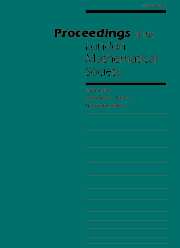Crossref Citations
This article has been cited by the following publications. This list is generated based on data provided by
Crossref.
Shkredov, Il'ya D
2009.
On a two-dimensional analogue of Szemerédi's theorem in Abelian groups.
Izvestiya: Mathematics,
Vol. 73,
Issue. 5,
p.
1033.
Шкредов, Илья Дмитриевич
and
Shkredov, Il'ya Dmitrievich
2009.
О двумерном аналоге теоремы Семереди в абелевых группах.
Известия Российской академии наук. Серия математическая,
Vol. 73,
Issue. 5,
p.
181.
Graham, Ron
and
Solymosi, Jozsef
2010.
Some Ramsey-type results for the n-cube.
Journal of Combinatorial Theory, Series A,
Vol. 117,
Issue. 2,
p.
189.
Шкредов, Илья Дмитриевич
and
Shkredov, Il'ya Dmitrievich
2010.
Анализ Фурье в комбинаторной теории чисел.
Успехи математических наук,
Vol. 65,
Issue. 3,
p.
127.
Fox, Jacob
2011.
A new proof of the graph removal lemma.
Annals of Mathematics,
Vol. 174,
Issue. 1,
p.
561.
None, None
2012.
A new proof of the density Hales-Jewett theorem.
Annals of Mathematics,
Vol. 175,
Issue. 3,
p.
1283.
Shkredov, I. D.
2012.
On the gowers norms of certain functions.
Mathematical Notes,
Vol. 92,
Issue. 3-4,
p.
554.
Шкредов, Илья Дмитриевич
and
Shkredov, Il'ya Dmitrievich
2012.
О нормах Гауэрса некоторых функций.
Математические заметки,
Vol. 92,
Issue. 4,
p.
609.
SANDERS, TOM
2012.
Approximate groups and doubling metrics.
Mathematical Proceedings of the Cambridge Philosophical Society,
Vol. 152,
Issue. 3,
p.
385.
Conlon, David
and
Fox, Jacob
2013.
Surveys in Combinatorics 2013.
p.
1.
Boshernitzan, Michael
and
Chaika, Jon
2013.
Diophantine properties of IETs and general systems: quantitative proximality and connectivity.
Inventiones mathematicae,
Vol. 192,
Issue. 2,
p.
375.
Ada, Anil
Chattopadhyay, Arkadev
Fawzi, Omar
and
Nguyen, Phuong
2015.
The NOF Multiparty Communication Complexity of Composed Functions.
computational complexity,
Vol. 24,
Issue. 3,
p.
645.
Prendiville, Sean
2015.
MATRIX PROGRESSIONS IN MULTIDIMENSIONAL SETS OF INTEGERS.
Mathematika,
Vol. 61,
Issue. 1,
p.
14.
Conlon, David
Fox, Jacob
and
Sudakov, Benny
2016.
Short proofs of some extremal results II.
Journal of Combinatorial Theory, Series B,
Vol. 121,
Issue. ,
p.
173.
Durcik, Polona
Kovač, Vjekoslav
and
Rimanić, Luka
2018.
On Side Lengths of Corners in Positive Density Subsets of the Euclidean Space.
International Mathematics Research Notices,
Vol. 2018,
Issue. 22,
p.
6844.
SANDERS, TOM
2019.
SCHUR’S COLOURING THEOREM FOR NONCOMMUTING PAIRS.
Bulletin of the Australian Mathematical Society,
Vol. 100,
Issue. 3,
p.
446.
Han, Rui
Lacey, Michael T.
and
Yang, Fan
2021.
A POLYNOMIAL ROTH THEOREM FOR CORNERS IN FINITE FIELDS.
Mathematika,
Vol. 67,
Issue. 4,
p.
885.
Chen, Xuezhi
and
Guo, Jingwei
2023.
A polynomial Roth theorem for corners in $${\mathbb {R}}^2$$ and a related bilinear singular integral operator.
Mathematische Annalen,
Peluse, Sarah
2024.
Surveys in Combinatorics 2024.
p.
159.
Kuca, Borys
2024.
Multidimensional polynomial Szemerédi theorem in finite fields for polynomials of distinct degrees.
Israel Journal of Mathematics,
Vol. 259,
Issue. 2,
p.
589.




